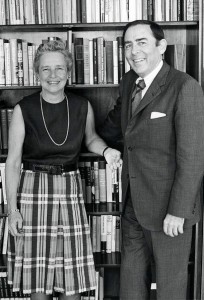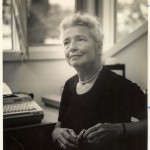Archived Content
This page is archived and provided for historical reference. The content is no longer being updated, and some of the information may have changed over time and could be outdated or inaccurate.

By William Elwood, Ph.D.
In the summer of 1912, a toddler took her uncle’s place in Bowdoin College’s graduation line. That uncle died along with the toddler’s grandfather in the sinking of the RMS Titanic. Though this little girl never stood on the tragic boat’s bow, her life ended up being as full of adventure as the fictional woman at the center of the ship’s 1997 namesake film. Matilda White grew up with her grandmother Edith in Brunswick, Maine, in a large house filled with then-exotic Hawaiian artifacts. Edith raised then adopted Matilda and managed part of the family’s textile firm while Matilda’s father traveled.
 Given such a role model, it is no surprise that a McGraw-Hill imprint published Matilda’s first book the year she turned 20, under the pseudonym of Mat White in order to overcome the obstacles of her gender. It also seems logical that these experiences informed a quotation for which Dr. Matilda White Riley later became famous: “People don't grow up and grow old in laboratories. They grow up and grow old in changing societies."
Given such a role model, it is no surprise that a McGraw-Hill imprint published Matilda’s first book the year she turned 20, under the pseudonym of Mat White in order to overcome the obstacles of her gender. It also seems logical that these experiences informed a quotation for which Dr. Matilda White Riley later became famous: “People don't grow up and grow old in laboratories. They grow up and grow old in changing societies."
Matilda White Riley: People don't grow up and grow old in laboratories. They grow up and grow old in changing societies
Dr. White Riley (1911–2004) was a member of the National Academies of Science. She worked at Harvard as a research assistant when the university’s enrollment was limited to men, so, she attended Radcliffe College, graduated magna cum laude, and went on to establish the Market Research Company of America. Dr. White Riley held professorships at Rutgers University and Bowdoin College, and was elected president of the American Sociological Association. At age 68, she changed careers and began a 20-year tenure at the NIH’s National Institute on Aging (NIA) to establish and direct its program for Social and Behavioral Research.
In addition, she served as a senior NIH spokesperson on the behavioral and social sciences, encouraged coordination among NIH Institutes, oversaw the production of reports to Congress, and advised several NIH Directors. Dr. White Riley initiated NIH’s behavioral and social sciences seminar series and built the infrastructure for what became the Office of Behavioral and Social Sciences Research (OBSSR). For the past nine years, the OBSSR has honored her storied life, legacy, and contributions with a series of sponsored lectures by eminent behavioral and social sciences scholars.

Dr. Matilda White Riley, in her crow’s nest home office in Mere Point, Maine, 1985
Given Dr. White Riley’s own impetus to help mold younger generations of scientists, this year the OBSSR will expand the observance of her enduring influence on the NIH with a panel of early-stage investigators (ESIs) (those who are within 10 years of achieving a terminal degree).
We thought it fitting, given the trailblazing woman that she was, to launch the call for abstracts for the Matilda White Riley Early Stage Investigator Honors as we celebrate Women’s History Month.
OBSSR commemorates Women's History Month: Call for Abstracts for Matilda White Riley Early Stage Investigator Honors
Call for Abstracts
If you would like to be one of the panelists, submit the abstract of an article that has been published after January 2015, or that is currently in press. The NIH’s Matilda White Riley Honors Selection Committee will rank these articles by how well they demonstrate behavioral and social scientific excellence in areas within the NIH’s mission and Dr. White Riley’s vision, including:
- An expanded conceptualization of health and wellbeing that includes effective cognitive, affective, and social functioning and quality of life;
- Behavioral and social sciences research results that improve the lives of people and society;
- The complex and dynamic interplay among processes at multiple levels (e.g., interactions between genes and the built, natural, and social environment);
- The influence of social and behavioral factors on physical health and the utility of this knowledge for clinical practice and health policy;
- Life-course perspectives on the development, health, and wellbeing of individuals and societies; or
- Research approaches that build theory and methods in the advancement of knowledge on health and wellbeing.
The OBSSR will pay the travel expenses for ESI honorees so that they can present their findings and participate in a moderated discussion of future research possibilities. The event will be held in the Washington, D.C. metropolitan area in June 2016. Specific date and location for this day-long event will be announced shortly.
Download the call for abstracts here.
Important Application Information
Key dates:
- Submissions deadline: April 15, 2016, 9:00 a.m. EDT
- Winners notified: May 16, 2016
Submissions should include:
- Article with abstract (reprint), or citation of peer reviewed journal with acceptance letter from peer-reviewed journal
- Author’s name, title, and affiliation
- Only one submission per (primary or secondary) author
Send submissions to [email protected] no later than 9:00 a.m. EDT on April 15, 2016.
Reviewers
The reviewers include but are not limited to:
- Rebecca L. Clark (NICHD)
- Bill Elwood (OBSSR)
- William Klein (NCI)
- Bill Riley (OBSSR)
- David Chambers (NIMH)
- Isabel Estrada Portales (OBSSR)
- Lisa Onken (NIA)
- Erica Spotts (OBSSR)
Additional Resources
Jones, D.G.B. & Tadajewski, M. (2011). Percival White (1887-1970): Marketing engineer. Marketing Theory, 11, 455-478.
Riley, M.W. (1973). Aging and cohort succession: Interpretations and misinterpretations. Public Opinion Quarterly, 37, 35-49.
Riley, M.W. (1978). Aging, social change and the power of ideas. Daedalus, 107, 39-52.
Riley, M.W. (1994). Aging and society: Past, present, and future. The Gerontologist, 34, 436-446.
Riley, M.W., Foner, A. (1968). Aging and society, vol. I: An inventory of research findings. New York: Russell Sage.
Riley, M.W., Foner, A. (1968). Aging and society, vol. I: An inventory of research findings. New York: Russell Sage.
Riley, M.W., Johnson, M.E., Foner, A. (1972). Aging and society, vol. 3: A sociology of age stratification. New York: Russell Sage.
Riley, M.W., Kahn, R.L., Foner, A., (Eds.). (1994). Age and structural lag: Society's failure to provide meaningful opportunities in work, family and leisure. New York: Wiley.
Riley, M.W., Riley, J.W., Jr., & Johnson, M.E., (Eds.). (1969). Aging and society, vol. 2: Aging and the professions. New York: Russell Sage.
Riley, M.W., & Riley, J.W., Jr. (1994). Structural lag: Past and future. In M.W. Riley, R.L. Kahn, & A. Foner, (Eds.), Age and structural lag: Society's failure to provide meaningful opportunities in work, family and leisure (pp. 15–36). New York: Wiley.
Riley, M.W., & Riley, J.W., Jr. (2000). Age integration: Historical and conceptual background. The Gerontologist, 40, 266-272.
Riley, M.W. (1963). Sociological research: I. A case approach. New York: Harcourt, Brace & World.
White, M., & White, P. (1931). Gliding and soaring: An introduction to motorless flight. New York: Whittesey House.
Photo Credit: Fotolia/ ar130405








